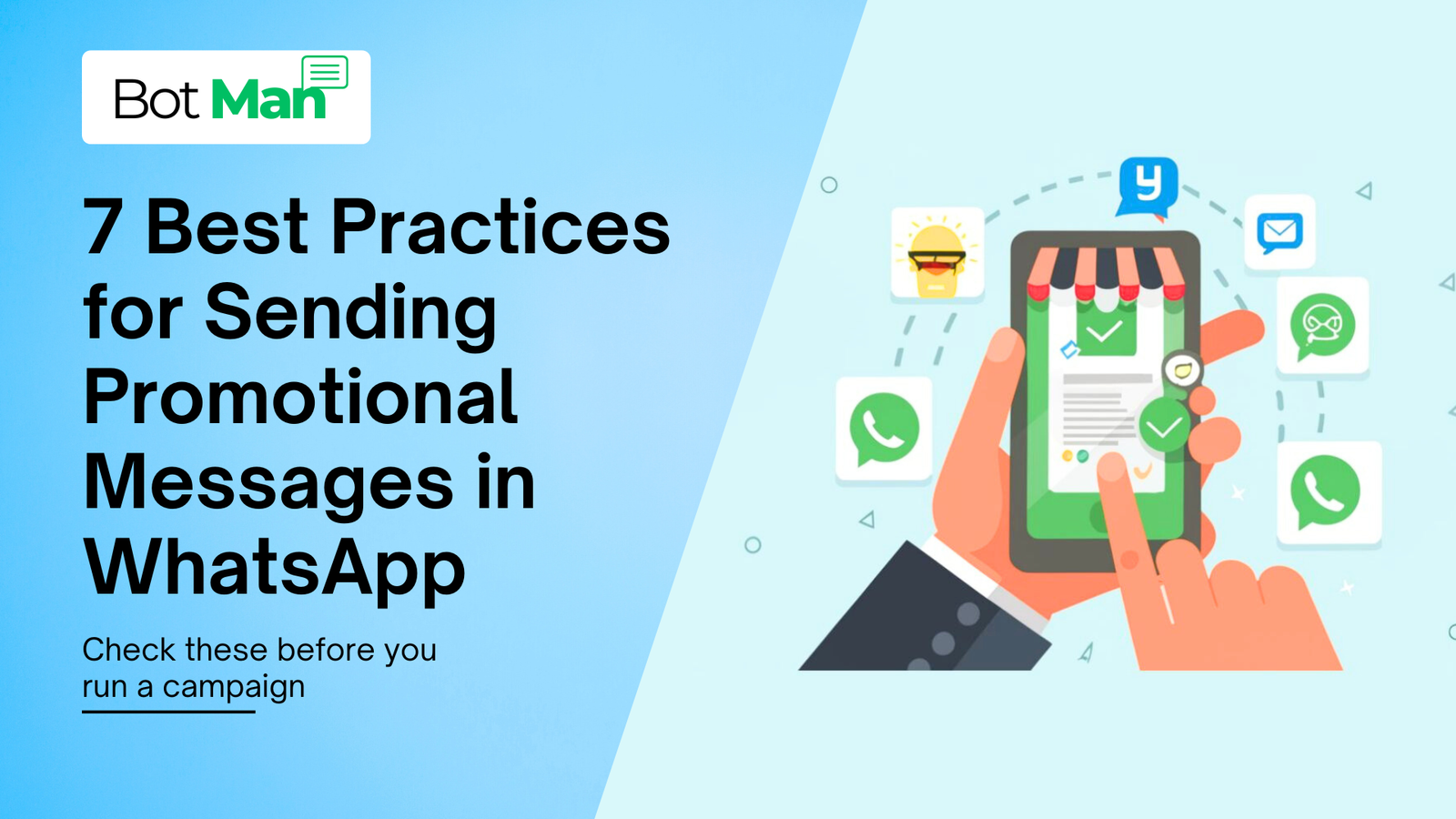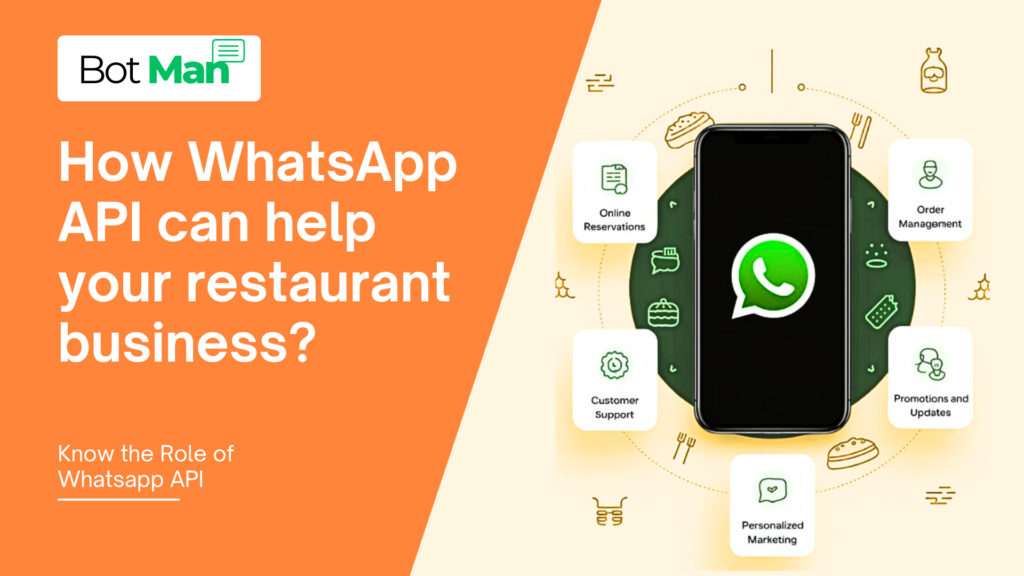Sending Promotional Messages with help of WhatsApp Marketing
With over 2 billion users worldwide, WhatsApp has emerged as a powerful marketing tool for businesses. The app’s instant messaging capabilities offer a unique opportunity for companies to engage directly with their customers. However, with great power comes great responsibility. To leverage WhatsApp effectively for promotional messages, it’s crucial to follow best practices that not only maximize engagement but also ensure compliance with privacy regulations.
In this blog, we’ll explore guidelines and tips for crafting effective promotional messages on WhatsApp while maintaining respect for user privacy and adhering to legal requirements.

Understanding WhatsApp Marketing
WhatsApp Marketing involves using the platform to connect with customers through personalized messages, promotional content, customer support, and more. Unlike traditional marketing channels, WhatsApp provides a more intimate and immediate form of communication, allowing businesses to foster closer relationships with their audience.
However, because WhatsApp is primarily used for personal communication, it’s essential to approach marketing on the platform with sensitivity and respect for privacy. Misusing WhatsApp for spammy or intrusive marketing can not only alienate your audience but also lead to legal repercussions.
Let’s dive into the best practices to ensure your WhatsApp Marketing efforts are both effective and compliant.
Best Practices for Sending Promotional Messages on WhatsApp
1. Obtain Explicit Consent
Before sending any promotional messages, it’s crucial to obtain explicit consent from your recipients. WhatsApp’s policies are strict when it comes to user privacy, and unsolicited messages can lead to your account being banned. Here’s how you can obtain consent:
- Opt-In Forms: Use opt-in forms on your website or social media channels to collect phone numbers. Clearly state that by providing their number, customers agree to receive promotional messages from your business via WhatsApp.
- Double Opt-In: After collecting the phone numbers, send a confirmation message asking customers to reply with a specific word or action to confirm their subscription. This double opt-in process ensures that users are genuinely interested in receiving your messages.
- Transparency: Be upfront about what kind of messages users can expect to receive and how often. This helps build trust and reduces the likelihood of users feeling spammed.
2. Personalize Your Messages
One of the biggest advantages of WhatsApp Marketing is the ability to create personalized, one-on-one communication with your customers. Personalized messages are more likely to be opened and read, as they make the recipient feel valued and understood.
- Use Their Name: Always address the customer by their name. This simple gesture makes the message feel more personal and less like a generic advertisement.
- Segment Your Audience: Group your contacts based on demographics, purchase history, or interests. This allows you to send targeted messages that are relevant to each group, increasing the chances of engagement.
- Tailor Content: Customize your content based on the recipient’s previous interactions with your brand. For example, if a customer recently purchased a product from your store, you could send a message offering a discount on a complementary item.
3. Keep It Short and Engaging
WhatsApp is primarily a messaging app, so long, text-heavy messages are likely to be ignored. To capture your audience’s attention, keep your messages concise and engaging.
- Be Clear and Direct: Get to the point quickly and avoid unnecessary fluff. Clearly state the offer or information you’re providing and include a strong call to action (CTA).
- Use Emojis: Emojis can add personality to your messages and make them more visually appealing. Just be careful not to overdo it—too many emojis can make your message look unprofessional.
- Include Multimedia: WhatsApp supports images, videos, and voice notes, so take advantage of these features to create more dynamic content. A short video or an eye-catching image can make your message stand out and increase engagement.
4. Respect Privacy and Comply with Regulations
Respecting user privacy and complying with regulations is crucial when using WhatsApp for marketing. Non-compliance can lead to penalties and damage your brand’s reputation.
- Follow WhatsApp’s Commerce Policy: Familiarize yourself with WhatsApp’s Commerce Policy, which outlines what types of content are allowed and prohibited. Ensure your messages comply with these guidelines to avoid having your account restricted.
- Adhere to GDPR and Other Privacy Laws: If you operate in or have customers in regions with strict privacy laws, such as the European Union’s General Data Protection Regulation (GDPR), make sure you understand and comply with these regulations. This includes obtaining proper consent, allowing users to opt out, and safeguarding customer data.
- Offer an Easy Opt-Out Option: Always provide an easy way for customers to opt out of receiving messages. This not only helps you comply with regulations but also builds trust with your audience by showing that you respect their preferences.
5. Time Your Messages Wisely
Timing can significantly impact the effectiveness of your WhatsApp Marketing campaigns. Sending messages at the wrong time can lead to low engagement or even annoyance.
- Consider Time Zones: If you have an international audience, be mindful of different time zones. Sending a promotional message at 3 a.m. in your customer’s time zone is unlikely to yield positive results.
- Avoid Peak Hours: While it might seem logical to send messages during peak hours, this is when people are often busiest. Instead, aim to send messages during quieter times when your audience is more likely to have a moment to read and engage.
- Test and Optimize: Experiment with different send times and analyze the results to determine when your audience is most responsive. Use this data to optimize your future campaigns for maximum impact.
6. Use a Professional Tone, but Keep It Friendly
While WhatsApp allows for a more informal style of communication, it’s important to strike the right balance between professionalism and friendliness.
- Match Your Brand Voice: Your messages should align with your brand’s voice and tone. If your brand is known for being fun and quirky, your WhatsApp messages should reflect that personality. If your brand is more formal, keep your messages professional but approachable.
- Be Respectful: Always maintain a respectful tone, even when dealing with difficult customers. Remember that WhatsApp is a personal space, and being overly aggressive or pushy can lead to a negative response.
- Use Greetings and Closings: Adding a simple greeting and closing can make your message feel more personal and polite. A friendly “Hello, [Name]!” at the start and a “Thank you for being a valued customer!” at the end can go a long way in building a positive rapport.
7. Leverage WhatsApp Business Tools
WhatsApp offers several tools designed specifically for businesses to enhance their marketing efforts. Utilizing these tools can help you create a more streamlined and effective WhatsApp Marketing strategy.
- WhatsApp Business App: This free app allows small businesses to create a professional presence on WhatsApp. It includes features like business profiles, quick replies, labels, and automated messages.
- WhatsApp Business API: For larger businesses, the WhatsApp Business API provides more advanced features, such as integration with CRM systems, automated workflows, and support for larger message volumes.
- Catalogs and Product Listings: The WhatsApp Business app allows you to create catalogs and product listings, making it easy for customers to browse and shop directly through the app.
- Analytics and Insights: Use WhatsApp’s analytics tools to track message delivery, read rates, and customer interactions. This data can provide valuable insights into what’s working and where you need to make adjustments.
Conclusion
WhatsApp Marketing presents a unique opportunity for businesses to engage with their customers in a more personal and immediate way. By following these best practices—obtaining consent, personalizing messages, keeping content engaging, respecting privacy, timing your messages wisely, maintaining a professional yet friendly tone, and leveraging WhatsApp’s business tools—you can craft effective promotional messages that resonate with your audience and drive results.
And if you’re looking for additional support in managing your WhatsApp marketing campaigns, consider working with a service provider like Botman. Botman offers comprehensive solutions for WhatsApp Marketing, helping you automate processes, engage effectively with customers, and ensure compliance with privacy regulations.
By implementing these strategies and utilizing the right tools, you can harness the power of WhatsApp to build stronger customer relationships, increase engagement, and grow your business. Happy marketing!



